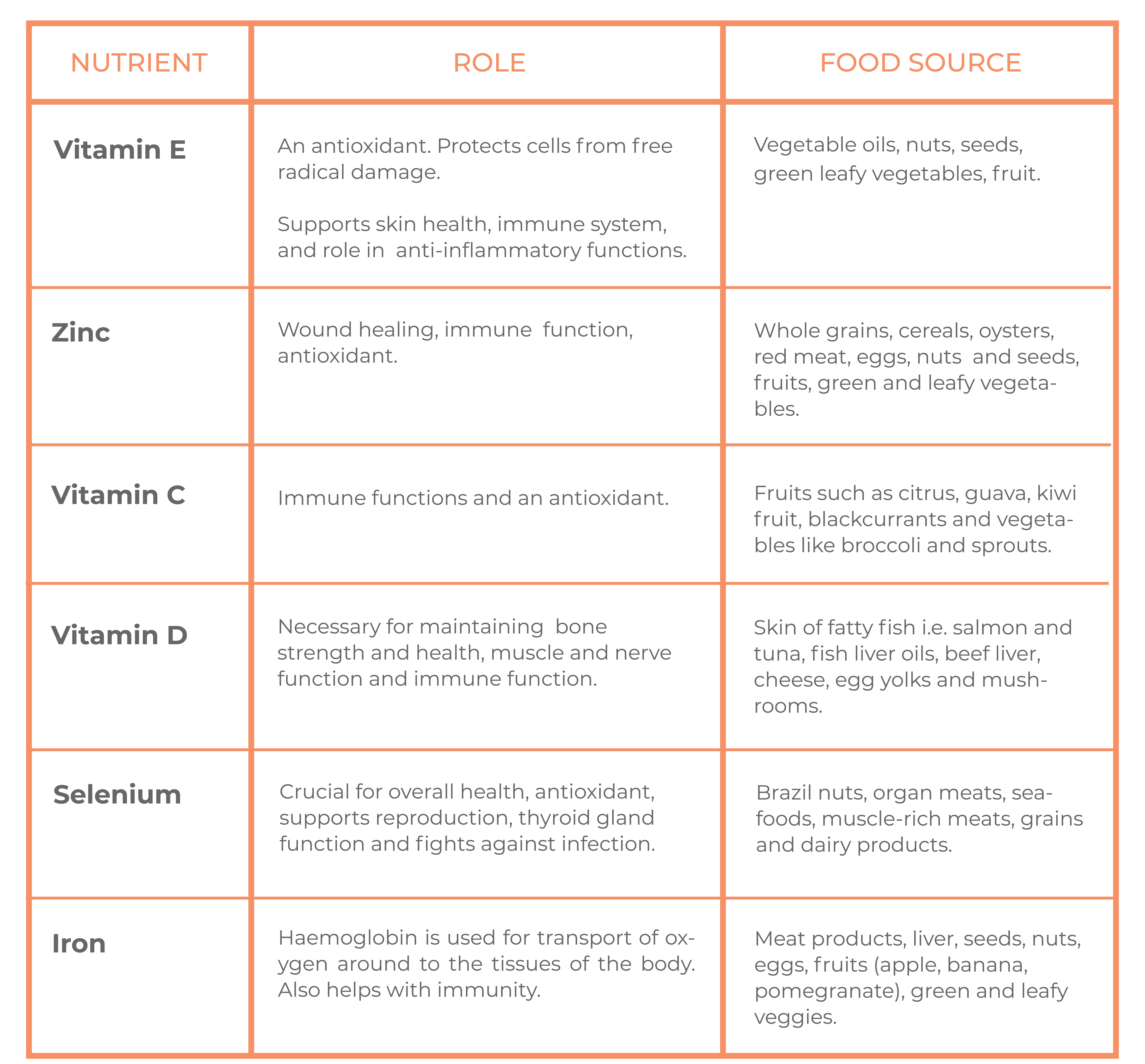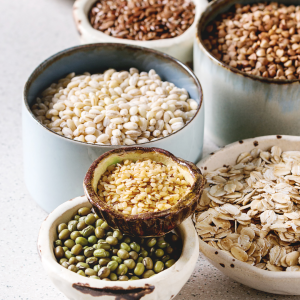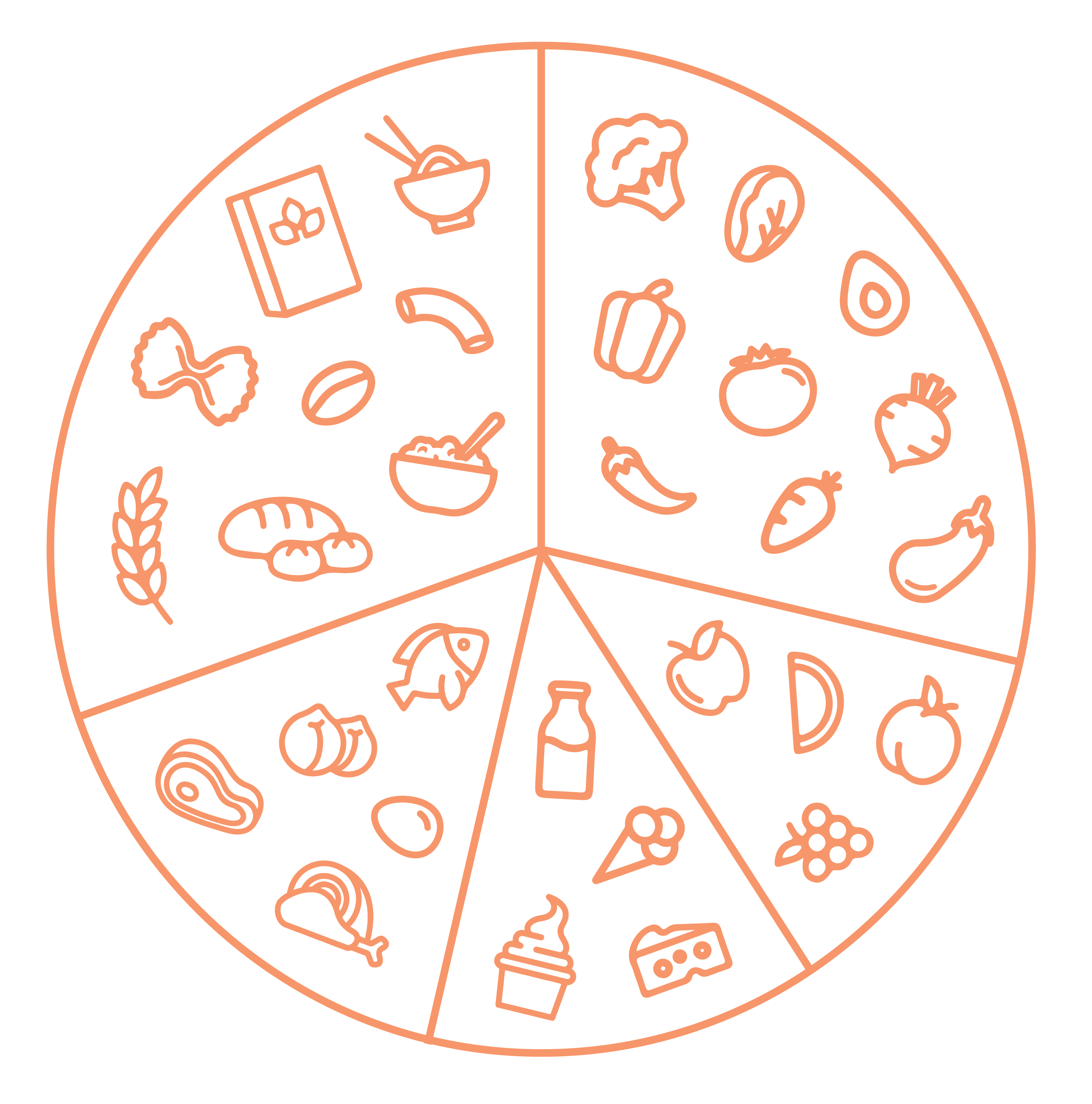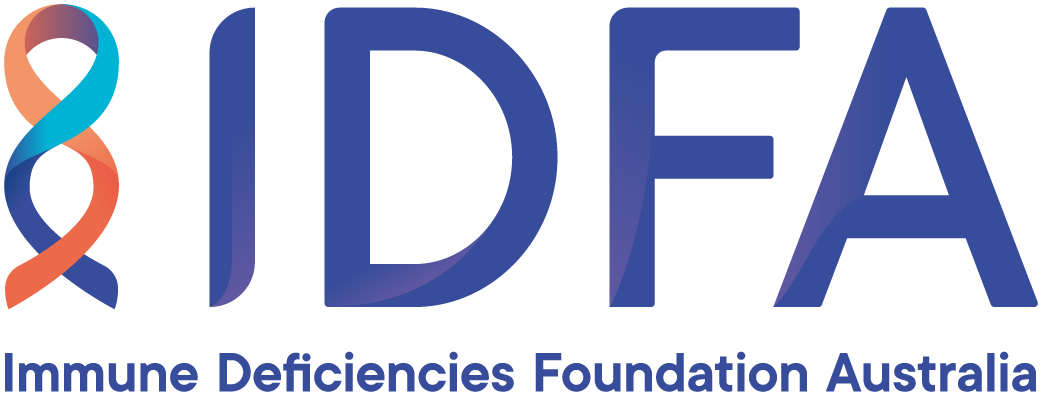LIFESTYLE SERIES
Nutrition
The Importance of Healthy Eating
Adequate and appropriate nutrition intake is required for all cells within the body to function optimally including the immune system. Some micronutrients and dietary components have very specific roles in the development and maintenance of the immune system to initiate effective responses against pathogens to allow for optimal immunological outcomes.
Nutrition and Immune Health
Quick Nutrition Tip
Eat a wide range of fruits and vegetables
“Eating a rainbow” can help you to be getting ideal amounts of key nutrients in your diet to support a healthy immune system.
The Immune System
The immune system is a complex system of organs and processes that actively fights against infections invading the body. The main parts of this system are white blood cells, antibodies, the lymphatic system, spleen, bone marrow, the complement system and thymus.
The immune system is divided into the innate and adaptive immune responses. The innate response is a rapid and generalised first response to an invading pathogen, whereas the adaptive immune response specifically identifies a pathogen and how to combat it effectively.
Quick Nutrition Tip
Choosing the right food is important in optimising mental health and mood.
Adequate and appropriate nutrition intake is required for all cells within the body to function optimally, including the immune system. Some micronutrients and dietary components have very specific roles in the development and maintenance of an optimal immune system to initiate effective responses against pathogens to allow for the best immunological outcomes.
Malnutrition is well understood to impair immune function, which may be due to nutrient deficiencies in dietary intake, development of poor nutrient absorption due to complications associated with illnesses or disease and other medical problems.
The poor dietary choices within the Western diet reveal harmful impacts on our immune system and these harmful immune modifications are likely to be passed onto our offspring. The Western diet is characterised by an overconsumption of sugar, salt, saturated fats and food additives and sweeteners. The high consumption of these nutrients in the diet reveals immune system impacts, such as increasing inflammation, heightening stress and disruption to gut microbiome.
Probiotics are dietary sources of live microorganisms that restore and improve the gut microbiota in the human intestinal tract, which can provide some beneficial health effects to the human body. They improve overall gut health, strengthen the immune system, have antioxidant and antihypertensive effects, support absorption of minerals, and reduce dermatitis and allergic symptoms. Probiotic food sources include dairy products such as yoghurt, aged cheese (cheddar, gouda, mozzarella), kefir and traditional buttermilk. They’re also found in non-dairy yoghurts, fresh and sour dill pickles, kimchi, kombucha, miso, natto, sauerkraut, tempeh and water or brine-cured olives.
Prebiotics are dietary sources of microorganisms that stimulate the development and activity of the gut microbiota in the human intestinal tract, which can enhance overall health and wellbeing. They improve and promote the development of various gut bacteria, stimulate the immune system, lower cholesterol levels, increase the absorption of calcium, and maintain the intestinal pH value of the gut. Prebiotics food sources include apples, artichokes, tomatoes, bananas, barley, berries, cocoa, garlic, green vegetables, soybeans, oats, onions, legumes and wheat.
The gut microbiota are the complex and dynamic micro-organisms that support various aspects of human health and wellbeing including innate immunity, energy metabolism and other physiological functions from within the gastrointestinal (GI) tract.
There is an interconnected relationship between the gut and the immune system where impaired immune functions is frequently caused or accompanied by disruptions in gut microbiota. The disruption of microorganisms of the gut microbiome leads to dysbiosis, which is associated with the development of intestinal and extra-intestinal disorders. Intestinal disorders include inflammatory bowel diseases, irritable bowel syndrome (IBS) and coeliac disease, whereas extra-intestinal disorders include allergies, asthma, metabolic syndrome, cardiovascular disease and obesity.
Antibiotics are medicines that treat infections and diseases by damaging bacteria so that the immune system can effectively fight back against the bacteria causing the infection. Unfortunately, antibiotic use can negatively affect the health of the gut microbiota by reducing the bacteria species and diversity, which can also affect immune function. To improve our gut health and support immune and overall health, it is beneficial to consume probiotics and prebiotics in our diet during and after antibiotic use to help restore lost bacteria.
Quick Nutrition Tip
Don’t skip breakfast!
Breakfast is important to maintaining a healthy weight, gives us energy and key nutrients to function effectively throughout the day.
Quick Nutrition Tip
Drink plenty of water!
Keep a water bottle on you wherever you go. Try drinking caffeine free herbal teas such as peppermint, ginger or lemon throughout the day. Aim for at least 2 litres of water per day.
Quick Nutrition Tip
Fruit for thought
Whole fruits are a perfect snack for morning and afternoon tea, especially when you don’t have time to prepare food!
Understanding Nutrients
Protein
Protein is a nutrient necessary for cell growth and repair, maintaining muscle, bone and tissue health and many other important functions of the body. Adequate daily protein intake is important especially during certain life stages where there is increased need such as childhood, adolescence, pregnancy and breastfeeding. Dietary sources of protein include meat, poultry, fish, cereals, grains, dairy food and vegetables.
Carbohydrates
Carbohydrates provide necessary energy to support important bodily functions and physical activity. Healthy sources of carbohydrates such as whole grains, beans, fruits and vegetables in the diet support health through providing vitamins, minerals and dietary fibre. Avoid carbohydrates such as white bread, pastries, soft drinks and other highly processed or refined foods in the diet as these may contribute to weight gain and promote diabetes and heart disease.
Dietary Fibre
Dietary fibre is resistant starch and components of plant materials that provide important nutritional and physiological effects for human health and wellbeing. It is a low density nutrient essential for the healthy functions of the gut and other beneficial effects including reduction in blood cholesterol levels, modulation of blood glucose and laxation properties. Dietary fibre food sources include wholegrain cereals, fruits and vegetables, legumes and soy products.
Dietary Fats
Dietary fats are naturally occurring fats and oils within animal and plant food products that are added to processed food products. Dietary fats are made up of two main types of fatty acids being saturated and unsaturated fats, where saturated fats are solid at room temperature and unsaturated fats are liquid. Unsaturated fats are associated with increased health benefits, whereas saturated fats are considered unhealthy due to their negative impact on cholesterol and health. Healthy food sources of fats include peanuts, nuts, avocado, oils (such as olive, sunflower, peanut and coconut), seeds, walnuts, oily fishes (salmon and trout), and plant oils.
It is also essential to be drinking enough water each day. Women should have around 2 litres or 8 cups and men should have about 2.6 litres or 10 cups per day.
Electrolytes are essential minerals within the body’s blood, sweat and urine that are required for a variety of the body’s functions and key for the body to maintain homeostasis and hydration. Consumption of electrolytes such as sodium, calcium, potassium, magnesium and zinc support the immune system through regulation and fighting bacteria and inflammation. Food sources include dairy products, green leafy vegetables, seeds and nuts, fruits and vegetables (such as banana, avocado and sweet potato), pickled foods and table salt.
Vitamins and minerals are essential nutrients required for bodily functions such as strengthening muscles and bones, hormone regulation, fighting infections and metabolic processes.
Eating a healthy and balanced diet of a variety of fruits, vegetables, grains, lean meats, legumes and reduced fat dairy products will provide your body with the vitamins and minerals needed.

Healthy Lifestyle Behaviours to Support Immune Health
Diet
The Australian Dietary Guidelines are based on the latest scientific evidence on food and health and have been constructed to provide the general Australian population with a guide on what and how much of the nutritious foods in each of the five food groups to include in a balanced diet each day.
A wide variety of nutrient dense foods should be consumed each day to support overall health and wellbeing, the quality of life and reduce the risk of chronic diseases.
Quick Nutrition Tip
Choose high protein or high fibre snacks
Snacks that are high protein or high fibre will keep you fuller throughout the day. Also be sure to choose snacks that are low in sugar.

Vegetables and Legumes/Beans
Vegetables and legumes/beans are a great source of vitamins and minerals. Nutrient dense and good sources include dark green leafy vegetables, potatoes, carrots, beetroots, beans, tomatoes, pumpkin and capsicum. Legumes are seeds of the plant including green peas and beans, lentils and chickpeas.
Children, adolescents, and toddlers are recommended 2-5 serves of vegetables and legumes/beans each day and adults are recommended 5-6 serves each day.

Grains
Grains are a great source of carbohydrates/starch, protein, fibre and are a good source of a wide variety of vitamins and minerals. Cereals and wholegrain foods can reduce the risk of developing certain diseases including coronary heart disease, colon cancer, diabetes and diverticular disease. Food sources that include grain (cereal) foods include mostly wholegrain and/or high cereal fibre varieties such as rolled oats, wholegrain breads, rice, pasta, polenta and quinoa. At least two thirds of grain foods eaten should be wholegrain. Wholegrain cereals contain more fibre, vitamins, minerals and antioxidants than refined cereal foods such as white bread.
Children, adolescents and toddlers are recommended to have 4-7 serves of grains each day and adults are recommended 3-6 serves each day.

Fruit
Fruit is a great source of vitamins, minerals, and fibre and provides many health benefits. Choosing fruits in season provides higher quality and better value. Include in your diet different coloured fruits to increase the variety of nutrients you gain. Some sources of fruits are apples, oranges, peaches, bananas, berries and grapes.
Children, adolescents, and toddlers are recommended 1-2 serves of fruit each day and adults are recommended 2 serves each day.

Protein
Lean meat and poultry, fish, eggs, tofu, nuts and seeds and legumes/beans are great sources of a variety of nutrients such as iron, vitamin B12, iodine, essential fatty acids, protein and provide many health benefits. These foods are usually the main source of energy in meals and there are a variety of ways to easily prepare and use these foods in the diet.
Children, adolescents, and toddlers are recommended 1-2 ½ serves of proteins each day and adults are recommended 2-3 serves each day.

Dairy
Milk, yoghurt, cheese and/or alternatives are a great source of calcium and many other nutrients that provide various health benefits. Food sources include reduced fat and full cream milks, plain and flavoured, long-life milks and dairy alternatives such as soy or almond milks. Other dairy products include yoghurts and cheeses and dairy or lactose-free alternatives.
Children, adolescents, and toddlers are recommended to have 1-3½ serves of dairy each day and adults are recommended 2-4 serves each day.

Discretionary Foods
Discretionary food choices are food and drinks that are not required to be consumed as they are not necessary for a healthy diet. This may be due to being too high in kilojoules (energy), low levels of nutrients, being too high in saturated fat, added sugars, added salt, or alcohol or being low in fibre. Discretionary foods and drinks include sweet biscuits, cakes, desserts, pastries, processed meats, fatty and fried takeaway foods, chips, sugar-sweetened beverages and alcoholic drinks.
Children and adolescents are recommended 0-5 serves of discretionary food choices or additional serves from the five food groups, with a maximum 5 serves being recommended for active and/or adolescent boys. Adults are recommended 0-3 serves of discretionary food choices or additional serves from the five food groups each day.

Enjoy a wide variety of nutritious foods from these five food groups everyday.
Graphic adapted from ‘Australian Guide to Healthy Eating’, Eat for Health.
Quick Nutrition Tip
Limit your intake of discretionary and highly processed packaged foods in your diet. They may be convenient but they have little nutritional value.
Quick Nutrition Tip
Serve with a side of vegetables
Serve meals with a side of veggies or salad to make sure to reach your recommended servings of five vegetables a day. Steam vegetables during the cooler months, or during the warmer months add a green salad with fresh vegetables.
Sleep
Good sleeping patterns and sleep quality are important in maintaining immune health. A lack of sleep duration and quality can influence disease risk. Adequate sleep duration may improve infection outcomes and is associated with reduced disease risk and reducing the severity and progression of disease.
Adequate dietary and nutrient intake according to the Australian Guide to Healthy Eating (AGHE) recommendations are important in supporting all aspects of lifestyle behaviours, including sleep, mood, energy, leisure and physical activity.
Research has identified associations between sleep and dietary patterns where consumption of low protein and carbohydrates and higher fat intakes resulted in poor sleep quality. However, incorporating sleep promoting foods such as milk, fatty fish, cherries and kiwifruit into your daily diet may provide benefits for acute and immediate sleep improvement.
Good Sleep Hygiene Practices
Exercise
Regular exercise can help with good sleep. Avoid strenuous exercise within four hours of bedtime.
Try again
When you can’t fall asleep after about 20 minutes, get out of bed and do something relaxing or boring such as reading in low lighting. Do this until you feel tired then return to bed and try again.
Eat healthy
Maintaining a healthy, balanced diet will help improve the quality of your sleep.
Reduce Caffeine & Nicotine intake
Avoid consuming stimulant products with caffeine such as coffee, tea, soft drinks and chocolate, or smoking cigarettes for at least 4-6 hours before going to sleep.
Regularity
Go to sleep at approximately the same time everyday to establish a regular sleeping pattern.
Reduce Alcohol intake
Avoid consuming alcohol for at least 4-6 hours before going to sleep.
Sleep when you need to
Try to sleep only when you feel tired instead of spending too much time lying awake in bed.
Avoid naps
Avoiding naps during the day can help to make sure that you’re tired at bedtime. If you can’t avoid naps, make sure it’s before 3pm and less than an hour in duration.
Exercise
Adequate nutrient intake and regular physical activity within a balanced and healthy lifestyle are important in supporting immunity and reducing disease risk. Within research, regular exercise has been shown to have anti-inflammatory and antioxidant effects on the body, influence gut health and the regulation of the immune system and may delay the onset of immune dysfunctions that occur with ageing.
Being active is important for all age groups to reduce disease risk, support healthy growth and development and to maintain physical and mental wellbeing.
The Australian Department of Health recommends that children and young people do at least 60 minutes each day of moderate to vigorous physical activity and to limit sedentary behaviour and maintain good quality sleep patterns. For adults, it is recommended that they are active on most days to achieve 2.5 to 5 hours of moderate intensity physical activity or 1.25 to 2.5 hours of vigorous intensity physical activity per week, including muscle-strengthening activities at least two days a week. It is also important for adults to limit sedentary behaviours and to maintain good quality sleep patterns.
Recipes
We’ve created these healthy, quick-to-prepare recipe ideas for you to follow for breakfast, lunch, dinner, snacks and dessert.
IDFA would like to thank Emilia Seidel for her contribution to this Lifestyle Series content and Tammie Seidel for the recipe photography.

This Lifestyle Series is supported by an unconditional educational grant from Takeda. Takeda has not determined and is not responsible for the content of this pamphlet.















